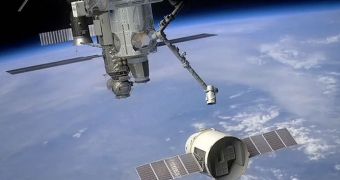With the inevitable retirement of the American space shuttle this summer, the United States will be left without any means of putting people or cargo in low-Earth orbit. This is why authorities are now starting to urge private spaceship builders to step up and fill the void left behind by the orbiters.
Discovery already flew its final mission, STS-133, earlier this year, and landed for the last time at the Kennedy Space Center on March 9. It is currently being processed so that it can be delivered to the Smithsonian National Air and Space Museum, in Washington, DC.
Endeavor will launch on STS-134 on April 29, for a two-week stay on the International Space Station (ISS). Upon its return, it will also be processed, and delivered to its permanent home in Los Angeles.
Atlantis will launch in late June on STS-135, which will be the last mission of the Space Shuttle Program. It will then be retired to the KSC Visitor Complex, for permanent display.
Starting at that point, the US will be left without the ability to supply the ISS with personnel or cargo for the first time ever. There are currently no vehicles capable to rendezvousing with the orbital facility.
This is why pressure on private space vehicle manufacturers such as Space Exploration Technologies Corporation (SpaceX) is mounting. They are being asked to accelerate the development and testing phases of their respective spacecraft, and to have them ready for flight as soon as possible.
SpaceX is the most advanced on these companies. It has already conducted two tests of its Falcon 9 rocket, the second of which managed to deliver the Dragon space capsule in Earth's orbit. It landed successfully after about 4 hours, and was recovered intact.
Now that this test is complete, the Hawthorne, California-based company is trying to move ahead with sending the first Dragon capsule to the ISS. Its cargo would consist of several tons of supplies, space parts, scientific experiments and personal items for astronauts.
“We have a very serious responsibility here because the space shuttle is coming to a close. What we've been told by NASA is that if we don't reach the space station by the end of this year, there's a risk that they will have to de-man the space station next year,” Elon Musk said recently.
“We've got to be sure that we get to the space station. That is very much our primary focus,” add the official, who is the founder and CEO of SpaceX. He made the announcement on Tuesday, April 12, at the 27th National Space Symposium, in Colorado Springs.
Other companies involved in the new space race, including Orbital Sciences Corporation (OSC), have recently taken steps to accelerate the development of their respective products. If they succeed, then we could see the ISS up and operational for more years to come, Space reports.

 14 DAY TRIAL //
14 DAY TRIAL //